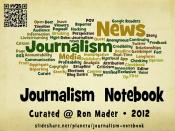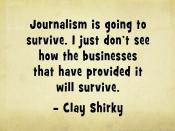Overview
The overall of this study examines the consequences of increasing audience participation in journalism processes. It also suggests that increased transparency between readers and journalist may weaken the occupation's authority too by leaving the jurisdictional area of journalism vulnerable to rival occupations, such as bloggers.
News organizations have invented a variety ways to increase audience participation in the journalistic process. However an increased interest in reader participation has also derived from the unique characteristics of online media which allow dialogue among news readers, interaction between reader and news sources, and personalized news.
During the 1980's, audience was quite concern in the industry over a perceived credibility crisis. Whereby recent studies shown there are dissatisfaction with journalist has been on the rise again within the disconnect between journalist and audience. However this growing disconnection has coincided with the growing presence of online news. Despite worries about inaccuracy and rumor in online journalism, online news enthusiasts view direct access to information and increased control by audiences as natural and desirable.
However in Durocher's (1998) view of point transparency may be economically advantageous to the industry as well.
Hence, a greater transparency on accessing to occupational knowledge and the impact on control over work could have created a work quite differently than its proponents believe. "Lifting the curtain" through online journalism could lead audiences to challenge the authority of journalism, and there is reason to believe that Internet use for "disintermediative" purposes has eroded the authority of other professionals.
Nonetheless for journalism and its occupational control, journalism by the estimation it has closer to semi-professional status than professional status. Whereby, journalism appears to have a less arcane, less complex knowledge base than professions with higher status. By its common view in the news construction literature is that journalistic professionalism is based on...


